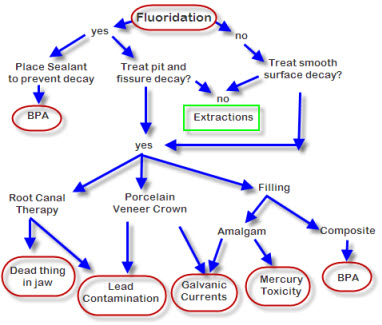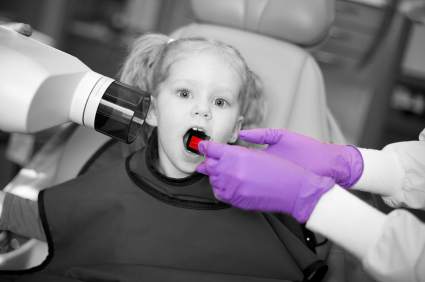
“Just this once; it’s okay.”
Does that sound like your practice? You know, you have a gaggy, bouncy kid who’s just about to tongue-thrust their way out of having those radiographs taken, but here comes Amazing Assistant to help you get a diagnostically acceptable image. SCORE!
The problem is that this never happens “just once.” I’ve seen the same person holding sensors in patients’ mouths dozens of times, and that’s when it becomes a problem. Yes, radiation is safer now that we’ve dialed it down and collimators make sure that there’s nothing scattering beyond the focused beam, but that doesn’t mean that we should be flippant about limiting exposure to our patients and most importantly, ourselves.
My best friend from high school could tell you not to hold those films in people’s mouths, too. She was a dental technician in the Navy and also worked for years in pediatric dental offices and orthodontics as an assistant, calming nervous children, helping them to have good dental experiences, and when she was exposing radiographs, sometimes she admits that she would make it easier on everyone if she would stay with the child while the x-rays were beaming through her hand.
She doesn’t have to tell you not to hold the films, though. She can just show you why you shouldn’t:
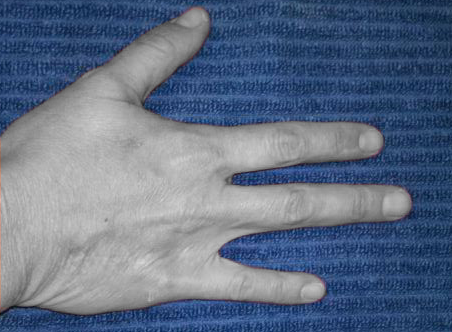
This is her right hand. Several years ago when she was doing laundry her finger caught on the dryer and “snapped.” This is important, sort of like when your patient tells you exactly what they were eating when their tooth broke – don’t you pay that the most attention of all? Because it was the darn dryer that was the problem….(!) Let’s be serious, though. Like you, her doctor really didn’t care what broke her finger, he wanted to know why it broke.
Turns out that she had developed a giant cell tumor in the first (proximal) phalange of her ring finger that had eaten everything except a small sliver of bone and that was what had snapped. These are very, very rare in small bones like those found in our fingers; most osteoclastomas happen in the larger bones like femurs and such. Hmmm.
Even though the tumor was benign, because of the damage done, the possibility of regrowth and other factors, the decision was made for my friend to have her ring finger amputated. I would have had her flip you the bird for effect but she no longer has a middle finger either…! (think about it…!)
So she was fortunate enough to stay in dentistry as a patient care coordinator for a few more years as she recovered but is now working towards her master’s degree for speech pathology. While she doesn’t seem totally convinced that excessive radiation exposure caused her to lose her finger, she doesn’t count it out for even a second.
And neither do I.
Losing a finger may be anecdotal evidence about the dangers of radiation, but it’s enough for me to feel like enforcing what we already know to be true.
![]()
Please share this story with those you care about, even if it makes you feel like the Radiation Nazi.
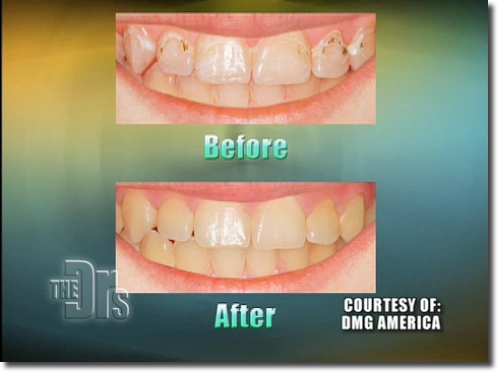

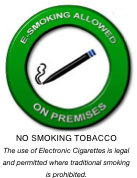 Is the American Lung Association with me? NO! Maybe it’s because they’re still getting a part of that $206 billion settlement from Big Tobacco back in 1998. Can’t put their sugar daddy out of bidness.
Is the American Lung Association with me? NO! Maybe it’s because they’re still getting a part of that $206 billion settlement from Big Tobacco back in 1998. Can’t put their sugar daddy out of bidness.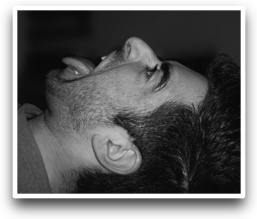 The next time your patient makes a yuck face at you with the accusation that the stuff that just hit their tongue has the most awful flavor EVER, you need to be sure and come back to this blog to share your experience so that your offending dental material can be rated accordingly.
The next time your patient makes a yuck face at you with the accusation that the stuff that just hit their tongue has the most awful flavor EVER, you need to be sure and come back to this blog to share your experience so that your offending dental material can be rated accordingly.
 Hi. I’m a very sad American Indian.
Hi. I’m a very sad American Indian. 